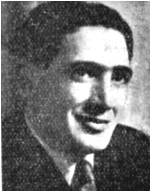 Harry (Zvi) Lipschitz, the son of Baruch and Alita, was born in Cherson in the Ukraine in 1920. In 1925 the family moved to Lithuania, and there he received a religious Jewish education and joined the Zionist Youth movement.
Harry (Zvi) Lipschitz, the son of Baruch and Alita, was born in Cherson in the Ukraine in 1920. In 1925 the family moved to Lithuania, and there he received a religious Jewish education and joined the Zionist Youth movement.
In 1934 the family immigrated to South Africa, and he attended the Jewish government school in Doornfontein, a suburb of Johannesburg. He quickly mastered English and completed his matriculation after attending night school. At the same time he also studied Judaism and the Hebrew language. In 1935 he joined the Hapoel Mizrachi movement (the forerunner of Bnei Akiva) and became part of the movement, displaying great enthusiasm and energy.
He was able to make speeches in both Yiddish and English. In Hapoel Hamizrachi he found his true home, becoming the chief reader at this group’s Sabbath afternoon and daily evening services. He began to stand out as a spokesman for Torah-Labor ideology, a forceful speaker at South African Zionist Youth conferences, and later as a member of the executive of the “Hapoel Mizrachi” and shortly before his departure for Palestine in 1946, vice-chairman and instructor of its Hashomer Hadati group. He regularly attended services at the Bertrams Synagogue.
He prepared himself for his future in his new country by learning about building and carpentry, and he earned a living by hard work.
In early 1946, he arrived in Palestine with a large group of some 40 young men and women, all pioneers heading for kibbutzim associated with their Zionist movements. Three of them from the Mizrachi religious Zionists went to Kfar Etzion.
Zvi worked independently in the building trade, and in the evenings he continued his studies in Judaism and aspired to advance his Torah studies at a yeshiva.
He found that religion and spirituality did not meet the high standard of the
ideals which he had brought with him from the Diaspora. He visited a number of other kibbutzim of the religious movement, but in the end he remained on Kfar Etzion in the hope that he would find his sought-after standards. He also insisted that the friends who accompanied him from the Diaspora should find their own fulfillment.
He carried out his duties as required: being a soldier under siege, participating in training and guarding, as well as working under these tough conditions, and he always believed in the final victory until his last moments. He loved animals and objected to their slaughter when food was in short supply; he thought that the animals were needed in these difficult days.
Adhering to his beliefs, he took up his defensive position on the western section of the kibbutz and fell there on 13th May as the whole Etzion Bloc fell. On the same day the Haganah defenders of the Old City of Jerusalem were forced to surrender.
On 17th November 1949 he was re-interred at the military cemetery on Mount Herzl.
Source: Translated from the Yizkor website by Joe Woolf

